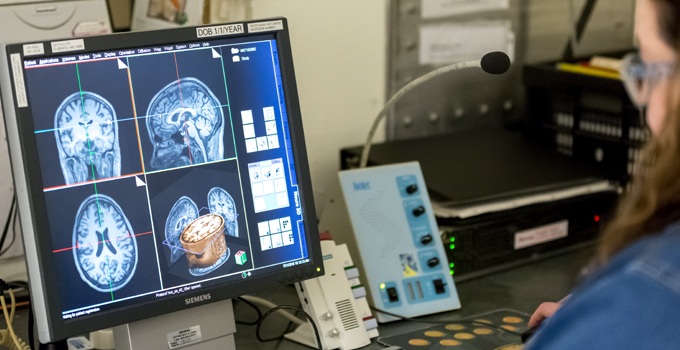There’s no shortage of skeptics on the topic of gut-brain health. After all, it’s not a stretch to link gut imbalance to irritable bowel syndrome. But now we’re focusing further north on how gut health might be associated with Lewy body diseases, a spectrum of disorders that includes Parkinson’s Disease and Dementia with Lewy bodies.
In a healthy gastrointestinal (GI) tract, resident microbes work in harmony with the brain to keep things running smoothly. This balance is called the gut-brain connection, or gut-brain axis. But when something throws those microbes off balance, things can go awry.
From where I sit—at an institute where neuropsychologists, gastroenterologists and neurologists collaborate, linking research to clinical practice—I see mountains of possibility in pursuing the gut-brain connection down unexpected paths.
When I talk with patients about the link between brain and gut health, it aligns with their own experiences and just makes sense to them. And early research into gut-brain interactions suggests the potential mechanisms are endless.

From my unique position at UNM HSC, I can integrate research and clinical perspectives to create a 360-degree view of patient treatment.
On the Right (GI) Tract
Dysbiosis is an imbalance of the gut microbiome that has been associated with various conditions from heart disease to autism, and links have been established between increased intestinal permeability (leaky gut) and psychotic disorders. Considering the human gut microbiome includes over 1,000 bacterial species, there’s no shortage of perpetrators to investigate.
For example, sulfate reducing bacteria, such as the Desulfovibrionaceae family, help regulate numerous bodily functions at normal levels. However, an increase in sulfate reducing bacteria, can harm the gut barrier and potentially trigger the aggregation of alpha synuclein—a protein that is the main component of abnormal deposits called Lewy bodies in the brain. Where these protein aggregates end up in the body has a lot to do with which symptoms people experience and how quickly symptoms progress.
It’s still controversial whether Parkinson’s disease pathology might start in the gut, but research from my lab and others shows this possibility is more than feasible.
High-Impact Potential of Gut-Brain Research
Each new study pulls us one step closer to discovering the root causes of several debilitating diseases. But there are many high-impact questions in the realm of gut-brain health still waiting to be answered.
At minimum, future discoveries will help improve treatments. For example, current Parkinson’s disease medications become less effective over time, partially due to dysbiosis. Figuring out which aspect of dysbiosis to target could improve medication efficacy.
In the most promising scenario, we could find that dysbiosis and leaky gut are playing a more causal role as early disease mechanisms, leading to treatments that will prevent Parkinson’s Disease or Dementia with Lewy bodies before the brain is impacted.
Shifting Focus to Other Symptoms
My lab is interested in the mechanisms driving Lewy body diseases, which manifest in different ways. For example, the first signs of Parkinson’s disease are usually motor symptoms whereas early symptoms of Dementia with Lewy bodies are typically cognitive. Some patients with Parkinson’s are stable for decades while the disease progresses quickly in others. We can’t yet answer the “why” behind these differences, so we’re approaching the problem from the most promising angles.
In Parkinson’s disease, current treatments focus on hallmark motor symptoms such as tremors. But the field is shifting toward non-motor symptoms such as cognitive impairment and autonomic nervous system dysfunction. These occur outside the brain and can affect cardiovascular and GI function.
In my lab we’re particularly interested in better understanding GI dysfunction and cerebrovascular dysfunction—two areas that are underexplored. We want to uncover the factors that lead to different symptoms and varying progression speeds of these disorders.
Rooting Out the Problem with Research
Researchers are still learning whether gut dysfunctions such as dysbiosis and leaky gut are secondary to disease processes or if they’re causes. To help solve this puzzle, my lab is resurrecting an original theory of Parkinson’s disease. This theory says that an unknown pathogen (which we now know is alpha-synuclein aggregates) develops in the gut and makes its way to the brain. By first investigating the gut, we hope to find the sources—or at least the influencers—of disease.
Our upcoming R01- National Institutes of Health study, called, will evaluate dysbiosis and leaky gut. We hypothesize that a bloom in sulfate-reducing bacteria is an important factor in Lewy body diseases. This research is foundational and aims to identify factors that warrant further investigation so we can get to the root of GI imbalance and its complications.
We’ll evaluate patients’ blood samples, stool samples, urine samples and lactulose breath tests, and we’ll also use neuropsychological testing, and neuroimaging. By analyzing these results, we can see which factors are present early in the disease course, how they behave in later stages, and if they are associated with clinical outcomes.
This research will help us pinpoint contributing factors, potentially leading to treatments that can get ahead of diseases like Parkinson’s and treat them before they take hold. The study will enroll three cohorts (in addition to a group of healthy participants): an idiopathic REM sleep behavior disorder cohort, a Parkinson’s disease cohort, and a Dementia with Lewy body disease cohort.
Interested in more details about this study and how to enroll?
For more information, email agingstudy@mrn.org or contact Dr. Ryman’s lab at (505)-803-5499.Faculty and Trainees Supporting Forward Motion
Getting this research project off the ground took collaboration from mentors spanning several disciplines:
- Sarah Pirio Richardson and Dr. Amanda Deligtisch in Neurology
- Henry Lin and Alex Birg in Gastroenterology
- Shanna Diaz in Sleep medicine
- Andrew Mayer and Dr. Andrei Vakhtin of the Mind Research Network
This close-knit, collaborative research community is the reason I returned to UNM Health Sciences Center after finishing my postdoctoral work in neuropsychology at Stanford University. I aim to continue in the tradition of supporting junior researchers and helping them collaborate to discover new treatments.
Trainees in my lab are always welcome to carve out a project of their own, and I am happy to provide support. I try to tailor the involvement of trainees so they are participating in projects that interest them and taking on roles that are beneficial to their careers.
In addition to our faculty assets, the research environment is also robust. For residents and fellows who are interested in research, there’s massive potential to be a part of life-changing discoveries. The Mind Research Network has the infrastructure to support magnetic resonance imaging (MRI), magnetoencephalography (MEG), and electroencephalogram (EEG), and the Nene and Jamie Koch Comprehensive Movement Disorder Center in the Department of Neurology has new equipment for transcranial magnetic stimulation (TMS) studies.
These significant resources all play an important part in helping advance research so we can develop new treatments that help patients by furthering knowledge about the connection between the gut and the brain.
Exploring your neurology education options?
Request an appointment with the enrollment team: Call 505-803-5499

